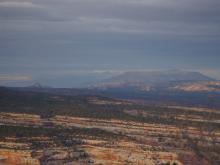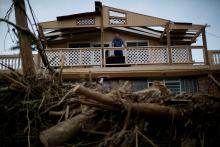environmental justice

Climate change is a crisis of moral proportions. Rather than responding to the climate crisis with resignation or cynicism, our congregations can chart a new path forward by responding to this moral crisis in a distinctively religious way. By probing deeply into our religious traditions, we can present truths that are needed in this time of climate catastrophe.

A desire to care for the environment also stems from the Christian traditions of compassion and love. Congregations have long worked to alleviate hunger, lift the poor and the vulnerable, and comfort the sick. Creating community gardens, making energy more affordable, and working to avoid the worst effects of climate change, which are disproportionately felt by low-income communities, stem from these traditions.

Organized by a number of local and national partners, the Freedom to Breathe tour bus is a “vehicle for social change” and moving art installation. The bus has been on the road since Aug. 25, capturing the stories of climate leaders and organizers in impacted communities across the United States and sharing them out under the hashtag #FreedomToBreathe.

Catovic, 53, is an American Muslim of Bosnian-Anglo descent who lives in New Jersey and serves as the senior Islamic advisor to GreenFaith, an interfaith coalition for environmental issues. He believes the responsibility of fighting climate change begins with the individual, but stresses that the Green Hajj is “not just about the more privileged parts of the Western World. I am just one person who is making this commitment. There are many other millions of people who are doing this too.”

AS SUMMER drew to a close, one of the great dramas in the planet’s ongoing environmental uprising erupted in a remote place, the Standing Rock Sioux reservation that straddles the border of North and South Dakota. The Army Corps of Engineers had approved plans for “fast-tracking” the Dakota Access pipeline, which would carry crude from the Bakken shale of North Dakota west to Illinois and then south to Gulf refineries. The pipeline was mostly on private land, and the company had gotten most of the necessary approvals from pliant state officials—but it had to cross the Missouri River somewhere.
The original plans had called for that crossing to happen just above Bismarck, a mostly white North Dakota city. But there had been concern about what would happen to the town’s water supply in the event of a leak, so the map had been redrawn, to take the pipe across the river just above the Sioux reservation. And the Army Corps had signed off on the plan—even though three other federal agencies, including the EPA, had raised serious objections. Just another day in the ongoing saga of environmental injustice that haunts this nation.
Except that this time something unexpected happened. The local Sioux said no: They erected an encampment blocking access to the construction work. And their message spread: White environmentalists joined them, as well as a crew from Black Lives Matter, but mostly other native Americans poured in, from all across the West—representatives of as many as 200 different tribal nations, according to reports. Chief Harry Goodwolf Kindness of the American Indian Movement commented that it has been well over a century since people from so many tribes had engaged in such joint action. “First time since the Battle of Greasy Grass,” he said, “so it’s been a long time.”

FOR MANY OF US, how people treat the Earth goes far deeper than “politics.” Our relationship with God’s creation is, at heart, a theological matter.
The Paris climate accord is not perfect—it does not go far enough and it is not binding. Nevertheless, it was a giant step forward to have 195 countries commit to curbing the carbon emissions that are endangering the planet and the people who live on it, especially the poorest and most vulnerable. That step was very important, the result of decades of hard work and diligent diplomacy.
Therefore, Donald Trump’s decision to withdraw the United States from the agreement is a theological failure and an abdication of American leadership on perhaps the most important crisis facing the world today. Politically, it was enormously shallow, arrogant, and truth-less: three words that sadly characterize many of the bombastic statements and decisions the administration has made.

The survey illustrates the intersectionality of race and environmental justice, referencing research by the NAACP that found that race is the principle indicator of the level of susceptibility to environmentally-caused negative health outcomes, as well as economic and pyschological impacts.

In an attempt to reframe the story of slavery and reclaim food traditions, she has dedicated a section of the garden to re-creating some of the farming techniques and foods that enslaved Africans brought to America.

Government officials have provided scant details for Day Zero logistics. Rather than communicate a clear plan of action, some are invoking fear with comparisons to World War II and 9/11.

The overall pattern that emerged is that concern about the environment has been flat over the past two decades, and in some cases declined. For example, more Christians prioritized economic growth over protecting the environment in 2015 than they did in 1990.

"The native Amazonian peoples have probably never been so threatened on their own lands as they are at present," the pope told a crowd of indigenous people from more than 20 groups including the Harakbut, Esse-ejas, Shipibos, Ashaninkas, and Juni Kuin.

During his time as administrator, Pruitt has met with several oil, gas, and other corporate entities in what he refers to as meeting with “stakeholders.” But many environmental leaders do not see his relationship with these corporations as innocent meeting, they believe he is interested in gaining their approval rather than dealing with environmental issues that many of these companies cause.

“However, we are resilient and refuse to allow President Trump’s unlawful decision to discourage us. We will continue to fight in honor of our ancestral warriors who fought for our way of life, for our culture and for our land too.

The Commission was tasked with determining whether the project is in the state's interest, but was prohibited from evaluating environmental issues because the pipeline already has an environmental permit.
Though the Obama administration rejected the project in 2015 on environmental grounds, President Trump reversed the decision in March 2017, saying the construction of the pipeline would produce increased jobs and decreased fuel prices. The reversal of the decision has been met with staunch opposition by those fighting for environmenal justice and indigenous rights.

Christians often want to be good Samaritans in dealing with the symptoms of sinful systems. So we lobby for asylum seekers to be allowed into the country and we advocate for tackling climate change. The two are not unrelated — climate change can be a driver of significant migration. Consider the Carteret Islanders, who are now abandoning their homes as the rising seas swallow their islands, and seeking a new life on Papua New Guinea. And some researchers have even suggested that climate change was a factor in the Syrian crisis, as a six-year drought drove up food prices and forced people into poverty.

Meanwhile, Puerto Rico remains flooded and without power. The aftermath of the storm continues to unfold as the damage builds upon itself, forcing hundreds from their homes. Without electricity, cell service, or reliable communications, the situation on the ground is difficult to imagine for Americans living on the mainland.

In my experience, Democrats in Congress see the iceberg and want to steer away while Republicans, with mercifully increasing exceptions, don't. Congressional offices tend to fall into three categories: climate affirmative, climate dismissive, and climate indifferent.

Supran and Oreskes said that while, as early as 1979, Exxon scientists acknowledged burning fossil fuels was adding more carbon dioxide to the atmosphere and causing global temperatures to rise, the company's position in newspaper ads remained significantly different by consistently asserting doubt about climate science.

For the brilliant theologians who teach and research at seminaries or divinity schools, part of their work is training the next generation of future pastors for church leadership. Catholic and many Protestant church leaders have received a thorough theological education (though not all). They possess Masters and Doctoral degrees that solidify their ability to grasp the tenets of theology. But for those theologians interested in changing the world for the better, they must offer work that is easily understood by the masses, especially the marginalized population they are seeking to assist.

In 2014, Flint began pumping water from the Flint River into the homes of Flint’s nearly 100,000 residents. Officials have admitted to not properly treating the water with appropriate corrosion measures, resulting in undrinkable lead-poisoned water.